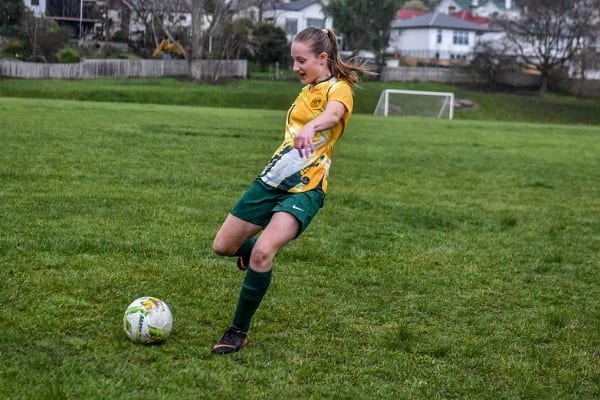Below, we’ve publish a piece she entered into the Tasmanian section of the Whitlam Institute’s What Matters? Contest. She was runner up in the contest, but her key objective was to get heard.
“You run like a girl”. Hearing those words frustrates and upsets me. They are never said as a compliment, but a put-down, as if all girls are slower and weaker than boys. We aren’t.
I believe sporting organisations, sponsors, the media and spectators send the message that we aren’t equal. They not only pay female athletes less than men, but don’t demand the same merchandise and media coverage, so they can get parity. It’s time to pay fair so we can play fair.
My passion is soccer and I feel like I have to prove myself every time I train and play. I can’t imagine how much pressure Australia’s national female soccer stars, the Matildas, are under when they go out on the pitch. They’re inspiring a generation of girls who want to be just like them, but when I read recently how much they earn for the amount they play, I became angry that women in sport are treated so unfairly.
Did you know that the best female players in the W-League, run by Football Federation Australia (FFA), earn an average of $17,400 a season? That’s not much more than the unemployment benefit, forcing many of the elite to remain in other jobs. The A-League men don’t have that worry, with the average wage $182,159.
Matildas’ captain Sam Kerr is likely to become the first Australian female footballer to earn more than $1 million a year by playing for her country, with Perth Glory in the W-League, as well as American club Chicago Red Stars and through sponsorship deals. That’s amazing, but it still isn’t fair. Kerr’s coach says she reminds him of Tim Cahill, the former captain of Australia’s men’s team, the Socceroos. Melbourne City apparently paid Cahill $3.5 million just to play in the 2016-17 A-League season – more than all 181 professional female players in Australia at that time combined.
Only about two years ago, it was reported that an entire women’s Australian Football League (AFL) team cost less than an average male player. In fact, a single female player earned 125 times less than a male player. The National Rugby League (NRL) was paying its men representing Australia $20,000 for a single match and the women $500 in 2014.
I have heard all the arguments about sporting organisations and sponsors needing bigger crowds and audiences to justify extra media coverage and merchandise so they can improve the pay. To me, it’s simple. If you haven’t watched the Matildas, or the awesome women competing in other sports with great skill and strength, then you are missing out on something really exciting! They’re role models and they deserve more money and respect.
The bosses of FFA, AFL, NRL and others have now promised to close the gender pay gap and improve the conditions for female athletes. They need to move fast because not only are America’s top women soccer players claiming discrimination but young girls like me expect equality.
It matters because we’re not second best.
My friends and I have a quote on our bedroom walls from now retired American footballer Mia Hamm, who is regarded as one of the world’s greatest women soccer players of all time. It reads: “My coach said I run like a girl, and I said if he ran a little faster he could too.”
Photo: Neil Richardson, The Examiner newspaper. Published here with permission.

